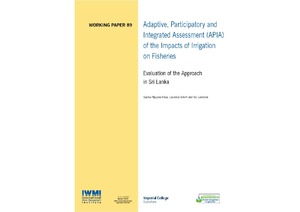Location
The International Water Management Institute (IWMI) is a non-profit, scientific research organization focusing on the sustainable use of water and land resources in developing countries. It is headquartered in Colombo, Sri Lanka, with regional offices across Asia and Africa. IWMI works in partnership with governments, civil society and the private sector to develop scalable agricultural water management solutions that have a real impact on poverty reduction, food security and ecosystem health. IWMI is a member of CGIAR, a global research partnership for a food-secure future.
IWMI’s Mission is to provide evidence-based solutions to sustainably manage water and land resources for food security, people’s livelihoods and the environment.
IWMI’s Vision, as reflected in the Strategy 2014-2018, is ‘a water-secure world’. IWMI targets water and land management challenges faced by poor communities in the developing countries, and through this contributes towards the achievement of the United Nations Millennium Development Goals (MDGs) of reducing poverty and hunger, and maintaining a sustainable environment. These are also the goals of CGIAR.
IWMI works through collaborative research with many partners in the North and South, and targets policymakers, development agencies, individual farmers and private sector organizations.
Resources
Displaying 581 - 585 of 959Carbon, land and water: a global analysis of the hydrologic dimensions of climate change mitigation through afforestation / reforestation.
This report highlights the potentially significant impacts on the hydrologic cycle and the importance of considering secondary effects, particularly with regard to water, resulting from the widespread adoption of global climate change mitigation measures. It is recommended that the implicit hydrologic dimensions of climate change mitigation should be more formally articulated within the international environmental conventions, and recognized within future UNFCCC negotiations on the CDM-AR provisions.
Adaptive, participatory and integrated assessment of the impacts of irrigation on fisheries evaluation of the approach in Sri Lanka
Assessing water availability under pastoral livestock systems in drought-prone Isiolo District, Kenya
Breaking the cycles of land degradation: a case study from Ban Lak Sip, Lao PDR
This issue of Water Policy Briefing is based on research presented in When ?Conservation? Leads to Land Degradation: Lessons from Ban Lak Sip, Laos (IWMI Research Report 91) by Guillaume Lestrelin, Mark Giordano and Bounmy Keohavong. The research was carried out by the Managing Soil Erosion Consortium (MSEC)?a multi-country collaborative effort to better understand land degradation, and potential solutions, in upland areas of Southeast Asia. MSEC is coordinated by IWMI with substantial contributions from France?s Institute of Research for Development (IRD).







